|
|
|
Sort Order |
|
|
|
Items / Page
|
|
|
|
|
|
|
| Srl | Item |
| 1 |
ID:
112090
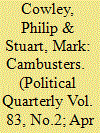

|
|
|
|
|
| Publication |
2012.
|
| Summary/Abstract |
The backbench rebellion that hit the Coalition government in October 2011 was one of the largest Commons revolts of the postwar era, on any issue. But it was not just its size that was noteworthy. This article outlines ten points about the origins of the vote, its timing, its composition, and the nature of the divisions it revealed. Facilitated by recent procedural innovations in the Commons, the rebellion was both evidence of a longer-term rise in dissent amongst MPs of all parties, as well as other medium-and short-term factors within the Conservative party. It leaves the Prime Minister caught in an impossible triangle, attempting to satisfy his pro-European Liberal Democrat partners in the Coalition, while keeping his Euro-sceptic rebels happy, and yet retaining enough credibility in European capitals to negotiate successfully.
|
|
|
|
|
|
|
|
|
|
|
|
|
|
|
|
| 2 |
ID:
124958
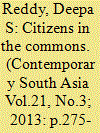

|
|
|
|
|
| Publication |
2013.
|
| Summary/Abstract |
This essay is based on ethnographic fieldwork conducted with the Indian community in Houston, as part of a National Institutes of Health and the National Human Genome Research Institute-sponsored ethics study and sample collection initiative entitled 'Indian and Hindu Perspectives on Genetic Variation Research'. Taking a cue from my Indian interlocutors who largely support and readily respond to such initiatives on the grounds that they will undoubtedly serve 'humanity' and the common good, I explore notions of the commons that are created in the process of soliciting blood for genetic research. How does blood become the stuff of which a civic discourse is made? How do idealistic individual appeals to donate blood, ethics research protocols, open-source databases, debates on approaches to genetic research, patents and Intellectual Property regulations, markets and the nation-state itself variously engage, limit or further ideas of the common good? Moving much as my interlocutors do, between India and the USA, I explore the nature of the commons that is both imagined and pragmatically reckoned in both local and global diasporic contexts
|
|
|
|
|
|
|
|
|
|
|
|
|
|
|
|
| 3 |
ID:
189413
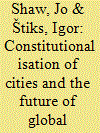

|
|
|
|
|
| Summary/Abstract |
The constitutionalisation of cities is analysed as a process through which urban residents operate as constitutionalising forces within their cities through lived experiences, practices and engagement, and cities try to impose themselves as constitutionalising forces within a rapidly transforming global society. This article explores the tensions generated by the constitutionalisation of cities. It focuses on identifying their character, assessing current economic and socio-cultural processes within cities and articulating a vision of the cityscape. Finally, it applies the idea of chronotopes, as developed in literary studies, to the study of cities. This multidisciplinary approach allows us to understand the constitutionalisation of cities, so far as they seek to break into a global society dominated by states and financial capital. It suggests a vision in which acts of urban citizenship may become emancipatory.
|
|
|
|
|
|
|
|
|
|
|
|
|
|
|
|
| 4 |
ID:
181896
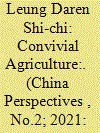

|
|
|
|
|
| Summary/Abstract |
The Chinese community-supported agriculture (CSA) movement is notable for advocating a revival of peasant farming and food sovereignty. For the emerging food politics in China, the main focus is the promotion of “ethical” food in the context of food scares. Currently this promotion often relies overwhelmingly on an emphasis of ethics of trust through certification of food by intermediaries. Yet, there is controversy among CSA activists, who question whether a certifying practice can improve the relationship between consumer and producer. This paper will present an emerging alternative approach within Chinese CSA circles that focuses on strengthening participatory culture within the consumer-producer nexus. To do so, I will shed new light on the experience of food and farming activism in South China since the late 1990s. The main focus is an empirical study of Chengxianghui (CXH), an organisation that operates various consumer-led action groups in Guangzhou. In order to conceptualise the approach by the activists, this paper outlines a normative framework referred to as “convivial agriculture” that is based on the Guangdong-based practice of the Participatory Guarantee System (PGS). The framework aims to recognise and negotiate responsibilities among different actors caring for the “agricultural commons.”
|
|
|
|
|
|
|
|
|
|
|
|
|
|
|
|
| 5 |
ID:
100274
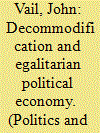

|
|
|
|
|
| Publication |
2010.
|
| Summary/Abstract |
This article contends that decommodification is an appropriate concept for understanding diverse initiatives such as fair trade, microfinance, open source, social enterprises, and the environmental commons as component features of a common process. Decommodification is conceived as any political, social, or cultural process that reduces the scope and influence of the market in everyday life. Given recent transformations in market societies, a more expansive framework for decommodification is urgently required. Decommodification would insulate non-market spheres from market encroachments; increase the provision of public goods and expand social protection; promote democratic control over the market by creating economic circuits grounded in a logic predicated on social needs rather than profit; and undermine market hegemony by revealing the market's true social costs and consequences. By ensuring basic needs, enhancing individual capacities and capabilities, and promoting social cooperation and collaboration, decommodification constitutes a central feature of an egalitarian agenda.
|
|
|
|
|
|
|
|
|
|
|
|
|
|
|
|
| 6 |
ID:
196669


|
|
|
|
|
| Summary/Abstract |
This research aims to contribute to the literature on Ottoman common and by analysing how mid-nineteenth century land codes influenced conflicts regarding common pastures in the Balkans. To accomplish this goal, two sets of primary sources are analysed: legal documents (Land Code of 1858 and Title Deed Regulation of 1859) as well as petition records from the Ottoman Imperial Archives. Case studies of land disputes occurring between commoners and large estate (çiftlik) holders in the Balkans are selected from the years following the enactment of these land codes. This selection enables an examination of the impact of these codes on the arguments presented by the conflicting parties. The central argument of this study points out that the Ottoman Empire’s efforts to codify land laws played a crucial role in shaping the disputes over communal pastures. However, it is equally important to underline that these legal changes did not signify an unqualified victory for private property rights over commons. Instead, the rural population countered landholders’ efforts by employing petitioning as a proactive strategy.
|
|
|
|
|
|
|
|
|
|
|
|
|
|
|
|
| 7 |
ID:
185110
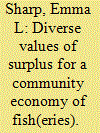

|
|
|
|
|
| Summary/Abstract |
This paper develops a diverse economies account of fish ‘waste’ that revalues it as ‘surplus’. We examine ‘Kai Ika’, a community marine conservation experiment in Tāmaki Makaurau (Auckland), Aotearoa New Zealand. Kai Ika rescues fish heads, frames and offal that were previously ‘going to waste’ and redistributes them to fish eaters who would otherwise struggle to access these foods. It involves fishers and community sector and Indigenous actors in an initiative that converts would-be waste into surplus. We examine the case as a diverse economic project that nourishes humans, enhances respect for fish as living beings, and potentially conserves marine resources in the face of global-to-local fisheries depletion. The research is based on community-gathered fish parts collection data, and virtual and email interview data. We analyse this data to produce an account of diverse ‘object values’ and fish-related surpluses that derive from surplus labour and other socio-cultural and environmental surplus. We argue that reframing fish economies in this way encourages new and diverse economic subjectivities and a more connected, relational and cooperative community economy of fish.
|
|
|
|
|
|
|
|
|
|
|
|
|
|
|
|
| 8 |
ID:
184064
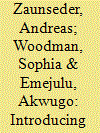

|
|
|
|
|
| Summary/Abstract |
For our special issue, ‘Radical Democratic Citizenship: From Practice to Theory’, we examine different forms of radical theorising and politics at the grassroots. Radical democratic citizenship entails forms of struggle against gross social, economic and political miseries and injustices. This special issue explores the implications of a renewed wave of revolutionary grassroots action. ‘Radical’ indicates firstly the potential for sustained fundamental change of the economic and political landscape that, secondly, is pursued from the grassroots, and, thirdly, through an egalitarian, democratic process that are transformative in rethinking and reshaping the parameters of what democracy can and should be. We raise the question of how localised alternatives -– which have been the most fertile terrain for such generation of different worlds – might be able to address wider questions of global inequality on our finite planet.
|
|
|
|
|
|
|
|
|
|
|
|
|
|
|
|
| 9 |
ID:
117878
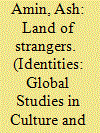

|
|
|
|
|
| Publication |
2013.
|
| Summary/Abstract |
This paper summarises a core theme running through the author's book Land of Strangers selected for discussion in this symposium. It examines the politics of intolerance towards minorities and migrants in multicultural and multiethnic Europe. It dissents from the prevailing view that this politics is symptomatic of a breakdown of social cohesion, in need of correctives of community, contact and border closure. Instead, the paper locates this development in a new 'catastrophist' biopolitics of risk and uncertainty that descends on the figure of the stranger, tapping into an ingrained vernacular of phenotypical racism. Accordingly, the paper argues for a politics of the commons that makes space for, and publicises, rituals of cohabitation, the shared commons, a welfarist biopolitics and other collective interventions that might strengthen civilities of indifference to difference.
|
|
|
|
|
|
|
|
|
|
|
|
|
|
|
|
| 10 |
ID:
095583
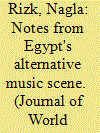

|
|
|
|
|
| Publication |
2010.
|
| Summary/Abstract |
The mainstream discourse in Egypt, as elsewhere, deals with music as a private good, where markets are best optimized by the price mechanism and creators are motivated by profits realized through unit sales. Such discourse is reflected in copyright law. Maximal intellectual property protection is presumed to keep the incentive system intact by formulating and enforcing ever-tighter copyright controls, and imposing sanctions on free-riding "pirates". This research adopts a different approach based on the premise that music embodies some characteristics of a public good, where the market mechanism typically fails to maximize both production and access, and where tension arises between the interests of producers and consumers. Extensive empirical research reveals that this tension is eased through business models and actual practices of music production and delivery as they exist on the ground in the alternative music scene in Egypt. These models of de facto commons are found to be more closely aligned with the interests of musicians and fans, and do in essence promote access to knowledge contrary to what the formal domestic IP law and policy formulation preach (but not enforce). This brings to question the relevance of copyright to the alternative music scene in Egypt, as opposed to the influence of prevailing social and cultural norms and economic realities.
|
|
|
|
|
|
|
|
|
|
|
|
|
|
|
|
| 11 |
ID:
117884
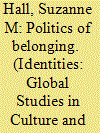

|
|
|
|
|
| Publication |
2013.
|
| Summary/Abstract |
The Politics of Belonging explores the contemporary conundrum between preservation and encounter: between deep national dependencies on migration and diversity, in parallel with a determined political resistance to recognise more fluid and hybrid forms of belonging in a highly mobile, uneven and interconnected world. Ash Amin's notion of a 'politics of the commons' provides the paper's orientation for how to engage in forward-looking as opposed to retrospective processes of updating notions of belonging. The paper connects three perspectives across the political, cultural and social spheres: a 'constitutional commons' (Taylor 2009), 'social solidarities' (Calhoun 2003), and 'cosmopolitan vernaculars' (Pollock 2000).
|
|
|
|
|
|
|
|
|
|
|
|
|
|
|
|
| 12 |
ID:
174808
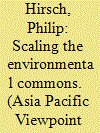

|
|
|
|
|
| Summary/Abstract |
The transboundary environmental commons in Southeast Asia are normally conceived in terms of shared resources and environmental impacts that transcend national borders. The Mekong's ‘fugitive resources’ of water, fish and sediment and the issue of Indonesia's smoke haze drift into Malaysia and Singapore dominate discussion. Assumed national interests shape actors and institutional arrangements for transboundary commons governance. Failure to address the governance challenges is explained in terms of their politico‐cultural failings (e.g. the ‘ASEAN Way’ of non‐interference), the weak regulatory remit of agencies with a specific transboundary governance role (Mekong River Commission), the dominant developmental agenda of subregional cooperative arrangements (Greater Mekong Subregion) or the geopolitical dominance of China (Lancang–Mekong Cooperation). This article builds on these critiques by considering the relationship between the local commons impacted by transboundary projects and the framing of the commons at an inter‐governmental level. It shows that neglect of the local commons and the impacts on them of projects with transboundary effects is partly to be explained by the institutional scaling of the transboundary commons at a country‐to‐country level. It also argues for an expanded notion of transboundary, including investment and governance flows as well as the material environmental footprint of large‐scale investments.
|
|
|
|
|
|
|
|
|
|
|
|
|
|
|
|
| 13 |
ID:
169340
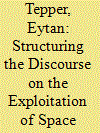

|
|
|
|
|
| Summary/Abstract |
A critical discussion is reemerging in space policy, economics, and law: on the classification, use and possible ownership of space resources, and the governance of these activities in terms of rules and institutions. The US legislation from 2015, recognizing the right of US citizens to all asteroid resources they obtain, clearly signals that “money time” has come, in every meaning. Planetary Resources, Inc. has declared this new legislation “the single greatest recognition of property rights in history”. Yet, the discourse on space resources, which are widely—but not necessarily duly—regarded as “commons”, is unstructured and crippled by the confusion of the notion and essence of “commons” between the economic and the legal meanings. This article provides a critical analysis of the “commons” feature of outer space and outer space resources, based on economic analysis and legal theory. More importantly, this article seeks to provide the structure for this important discourse. The first critical step is to distinguish between (i) commons as an economic term and (ii) commons as a legal regime. The first refers to a type of goods or resource used by multiple users, and the second refers to a property rights regime, the ownership over the resource. A mistake, often made, is the confusion between the economic notion of “commons” and the legal sense of the same concept. An “economic commons”, such as a lake, may have different property rights regimes as it may be private property, government property, or “legal commons”. The second critical differentiation is between the different parts of space (e.g. orbits, celestial bodies, and void space) because some may be “commons” (economic and/or legal) while others may not. Asking whether “space” is commons wrongly puts numerous things in a single basket is a sweeping generalization and, in the economic sense, utterly meaningless. Another important distinction is between resource systems and resource units. If we get the questions wrong, i.e. by confusing the terms and mixing different subjects of inquiry, we will not, by definition, find the right answers. Furthermore, the article demonstrates that the notion of “global commons”, often applied to outer space, is of limited or unclear meaning, and it does not imply the property rights regimes in the domains and resources it presumably describes, including outer space. The article opens with making the aforementioned three distinctions in section two. Sections three and five present, separately, the economic and legal notions of “commons” and examine whether some parts of space qualify as economic and/or legal commons, whereas section four presents the limitations of the notion of “global commons”, thus leading to section five. The article concludes by connecting the economic and legal discussions to the search for appropriate governance models for each part of space. As the article demonstrates, the real questions in the discourse are much more complex than “is space commons?”. Although this article provides preliminary answers to the questions it raises, its main contribution is the reshaping of the question(s) currently being asked and the structuring of the discourse on space resources and their governance.
|
|
|
|
|
|
|
|
|
|
|
|
|
|
|
|
|
|
|
|
|